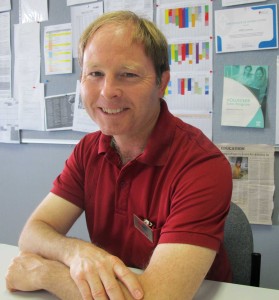Unity a mission in one man’s life

Stephen Hall, English language teacher
Helping people connect with each other while assisting them to learn are the inter-related twin passions of English language teacher Stephen Hall.
The 47-year-old teaches English to newly arrived migrants and refuges in Melbourne. He is a member of the Focolare Movement, an international organisation that promotes the ideals of unity and universal brotherhood.
He recently spent two years living in Loppiano, a small town 20 kilometres south of Florence, in the beautiful rolling Tuscan hills, to actively engage in the ideals of unity and the notion of our common humanity.
“It was a great experience in a beautiful setting – with squirrels, wild boar and deer running around in the forests” Stephen said.
“People move to Loppiano to learn how to live in unity and then try to bring unity back to their own communities. Living in a community that is focused on unity gives you a whole new perspective on life and what is really important,” he said.
“There were people from about 70 different countries living there – families and young people, university students, economists – people from all walks of life and different faiths.
“The aim of the organisation is basically to ask ‘what does it look like when you live in unity’.
“I was there to coach, mentor and accompany young men who have the calling to devote themselves as single men to their faith – I guess that is what you might call being a monk.
“We lived in houses like a family and we put our money in common. We all worked at whatever we could find to earn some money so we did some odd jobs, fruit picking and packing jobs.
“At the beginning of each month we’d look at how much money we expected to have and plan how we would spend it – and we’d try to squeeze in a visit to somewhere interesting in Italy,” he said.
“The whole experience was brilliant. I had lived at Loppiano before as a young man when I myself trained to live in community. This time around I was able to share in the joys and trials of the guys just starting out. Being part of the process helping them to discern what path they would follow in life was a great privilege.
“I was able to interact with many groups visiting us as well. One group which I remember well was a group of women students from the Islamic University in Qom, in Iran. It was very interesting to see the commonalities between us,” he said.
Stephen says he has always felt attracted to helping unite people.
“I’ve always been interested in the idea of bringing people together and my work with settlement agency AMES fits in with this sort of personal value,” he said.
“And building interfaith contacts is something I’m very much involved in; fostering understanding and friendship between people of different faiths.
“That’s why I love my work at AMES and am grateful to be here. I love the idea that we are trying to bring people together and sometimes help to transform experiences of great suffering to help people arrive at a peace and to make a new start with their lives.
“It is also gratifying to be working among a group of people who go the extra mile,” he said.
During his sojourn in Italy, Stephen encountered some inspiring people.
“I met an Anglican bishop from New Zealand who is involved in trying to stop modern slavery. He’s part of an international group that is trying to get multinational companies to remove any slavery from their chain of production,” he said.
“There was also a refugee family from Syria who lived with us for some time. It was inspiring to see how they were trying to be positive in the face of the hardships they’d been through.
“And I met a priest from a country devastated by civil war who had been trying to help people from both sides of the conflict. He saw them just as people in need whatever their politics,” Stephen said
His passion for inclusive diversity and helping people connect with each other is reflected in his teaching philosophy and methods as applied to helping newcomers to Australia learn English.
“I always wanted my students to call me by my first name ‘Stephen’ but they found it difficult to call me anything other than ‘teacher’,” Stephen said.
“So I started to call them teacher too. I want them to realise that they are part of their own education and they have to educate themselves as well.
“I want them to help educate each other so the classroom becomes a community of learners,” he said.
Innovative teaching methods and interactivity are part of Stephen’s stock-in-trade.
“I use a lot of pictures of topics that are familiar to the students. So that might be a family eating a meal or people shopping at a market,” he said.
“We have a discussion about the images and then some dictation. Then, in a group, they have to try to re-piece the dictation together by drawing on their knowledge of English.
“We also use interactive and visual strategies and even singing and cooking to put the learning of English in real, physical context,” Stephen said.
Founded in 1943 in Trento, northern Italy, by Chiara Lubich as a religious group; the Focolare Movement, though primarily Roman Catholic, now has strong links to the major Christian denominations and other religions. It has also, in some cases, links with non-religious groups.
It is also called the “Opera di Maria,” or “Work of Mary”.
The Focolare Movement operates in 182 nations and has over 100,000 adherents. The Movement’s name comes from the Italian word for “hearth” or “family fireside”.
Laurie Nowell
AMES Senior Journalist












